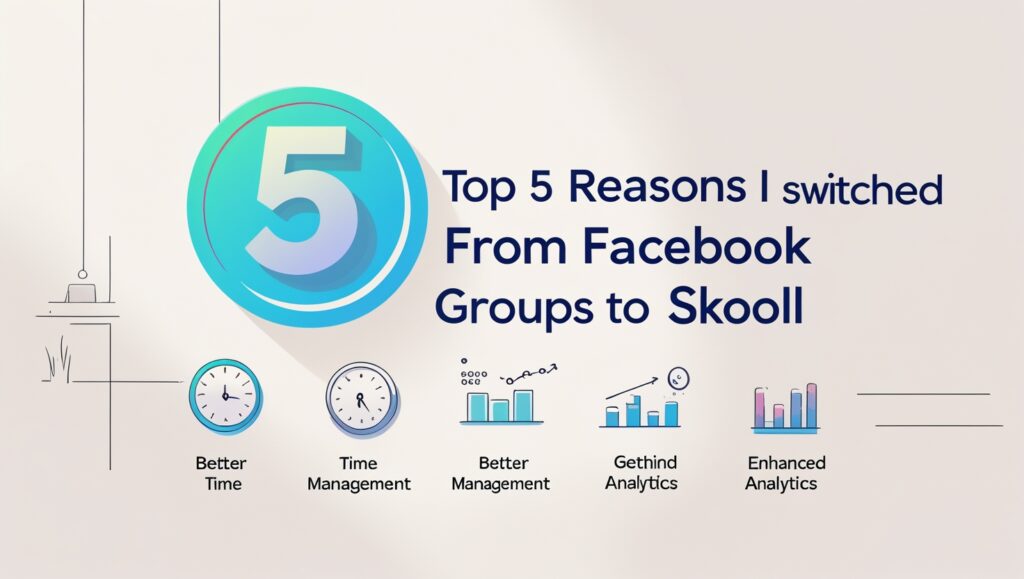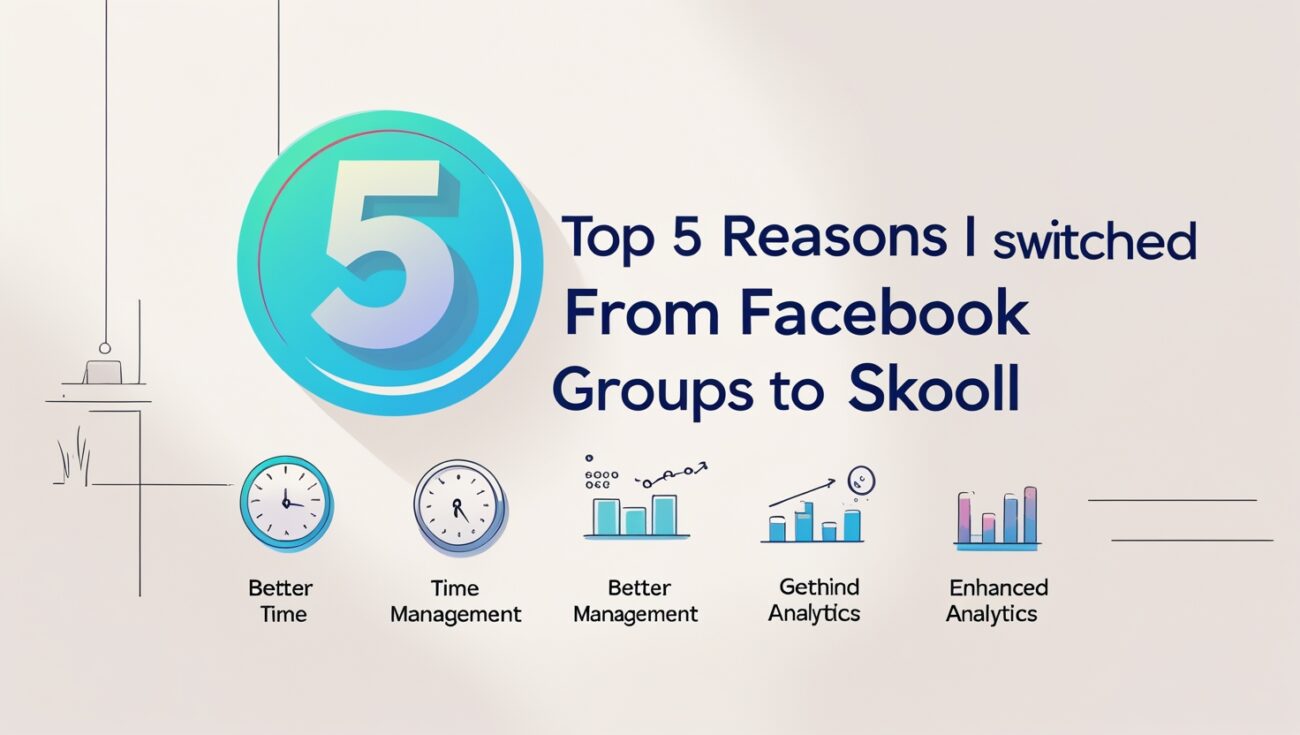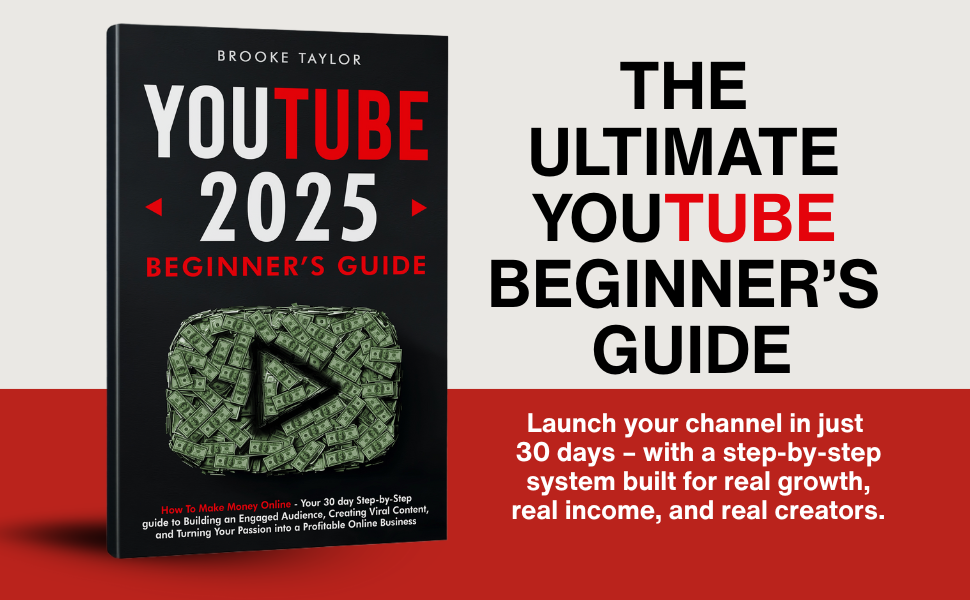Top 5 Reasons I Switched From Facebook Groups to Skool
For years, I used Facebook Groups to run my communities, share content, and connect with people around my brand. But as time passed, I started feeling more frustrated than fulfilled. Engagement dropped. People were constantly distracted. And I was competing with memes, ads, and the algorithm just to be seen.
That’s when I found Skool, and after just a few days of trying it, I knew it was the better platform for what I wanted to build — a focused, paid membership community that actually grows.
In this post, I’ll walk you through the top 5 reasons I personally switched from Facebook Groups to Skool — and why I haven’t looked back since. If you want to explore Skool for yourself, here’s my referral link:
Join Skool and create your own group here

Table of Contents
1. No Algorithm = Everyone Sees Your Content
The biggest frustration I had with Facebook was never knowing who saw my posts. Sometimes I’d drop valuable lessons or time-sensitive announcements — and only 10% of the group would actually see them. That’s because Facebook controls visibility through its algorithm, and most of your content gets buried.
With Skool, every post shows up in chronological order. Members get notifications for new lessons, comments, or updates. I no longer have to “beat the algorithm” just to stay connected. My community is actually active because they’re not missing my posts.
2. No Distractions or Ads Competing for Attention
On Facebook, your group lives next to political rants, vacation photos, and targeted ads. Even when people want to engage, they get pulled in a hundred directions. That’s just how the platform is designed — to keep people scrolling, not learning.
Skool eliminates all of that. It’s a clean, focused space where your content and community are the only priorities. When members log in, they’re not bombarded with ads or endless notifications. They’re there to learn, connect, and grow. That’s exactly the kind of environment I wanted for my brand.
3. Built-In Course Hosting and Calendar
Before switching, I had to host my lessons on a separate platform and link everything back into the group. It was messy. Sometimes people got confused, lost links, or forgot to attend live calls. With Skool, everything lives inside one platform — my courses, my calendar, and my community.
I upload my videos and PDFs into the “Classroom” section, and schedule calls using the built-in calendar. My members know where to go and what to expect. It’s simple, professional, and saves me hours of follow-up every week.
4. Stripe Integration and Monetization Tools
Facebook Groups don’t allow you to charge for access directly. That means I had to collect payments elsewhere, manually approve people, and track subscriptions using spreadsheets. It was time-consuming, and honestly, not scalable.
Skool changed that overnight. I connected my Stripe account once, and now payments, subscriptions, and member access are handled automatically. Whether I’m running a $27/month group or a high-ticket mastermind, it’s all built in. If you want to try it for your own business, here’s my link:
Click here to start with Skool
5. Higher Engagement and Member Retention
What surprised me most was the shift in energy. People engage more on Skool. They comment, complete lessons, show up to calls — and stay subscribed longer. That’s because the platform encourages focused interaction. The points system, leaderboard, and clean design all work together to create a community-driven experience.
I didn’t have to beg people to participate. I just showed up consistently, posted valuable content, and the structure of Skool kept things moving. I believe that’s what makes it powerful — it’s not just software, it’s a system that supports real engagement.
Final Thoughts
If you’ve been struggling with low engagement, tech headaches, or the chaos of Facebook Groups, I totally understand. I was in that exact place until I gave Skool a try. And honestly, switching platforms was one of the best business decisions I’ve made.
Now I spend more time building my community — and less time managing tech, chasing people, or fighting the algorithm.
If you want a platform that simplifies your process, increases member engagement, and helps you grow a paid community that actually feels alive, I strongly recommend Skool.
Start your Skool community here
Another thing I noticed immediately after switching was how organized everything became. On Facebook, content gets lost fast. Even if I pinned a post or created a guide, people rarely found what they needed without asking me directly. On Skool, I can tag posts, categorize lessons, and guide members step-by-step. It saves me time and keeps my group running smoothly without constant babysitting.
I also love that Skool feels like mine. When I ran groups on Facebook, it always felt like I was renting space on someone else’s land. One algorithm change, one random group shutdown, and all my hard work could disappear. With Skool, I control the experience. There are no ads, no hidden rules, no threats of being de-platformed — and that peace of mind is worth everything to me.
A big bonus was the improved onboarding experience. Before, I had to manually explain how everything worked, send multiple emails, and hope people stayed engaged. Now, when someone joins my Skool group, they immediately land in a structured space. They can see the classroom, browse upcoming calls, introduce themselves, and get started without needing extra instructions.
What really makes Skool powerful is that it’s not trying to be everything. Instead, it focuses on doing a few key things extremely well — hosting communities, delivering content, and collecting payments. That simplicity is what makes it so effective. As a creator, I don’t want 50 features I’ll never use. I want tools that work, and Skool gives me that.
One unexpected benefit has been the community vibe. Skool makes it easy for members to connect with each other — not just with me. I’ve seen friendships form, people collaborating on projects, and members helping one another without me needing to lead every conversation. That kind of organic engagement never happened in my old Facebook group.
The built-in points and leaderboard system actually works better than I thought. At first, I wasn’t sure if members would care about gamification. But they do. It turns engagement into a fun, rewarding experience, and I’ve noticed people posting more just to climb the leaderboard. That kind of activity boosts energy in the group and keeps things flowing.
I also like how Skool encourages me to keep my content fresh. The platform is so easy to update that I’ve started releasing weekly lessons and surprise bonuses. On Facebook, uploading content felt messy. Here, I just add a new module in the classroom and everyone sees it. That has helped me increase perceived value and reduce cancellations.
Let’s talk about pricing. Skool is a flat $99/month. That includes everything — unlimited courses, members, and monetization tools. When I compare that to what I used to pay for Kajabi, Zoom, Facebook group management tools, and my cart software, it’s a no-brainer. Skool saves me money and headaches at the same time.
I’ve also been using Skool’s affiliate program, which pays 40% recurring for every person I refer. I didn’t join Skool for the affiliate money, but it’s a nice bonus. Since I actually use and love the platform, I don’t feel weird recommending it. If you’re reading this and want to test it out, here’s my referral link:
Start your Skool group here
Since moving to Skool, I’ve noticed that people stay longer. Retention is higher because the experience is better. They get value, community, structure, and access all in one place. When people feel connected and supported, they don’t want to leave. And that consistency in my revenue has helped stabilize my business.
I’ve also found that Skool gives me more freedom. I’m not constantly monitoring posts, handling tech issues, or answering questions about where to find things. That frees me up to work on the next launch, help my clients more directly, or even take time off without worrying the group will fall apart.
In the end, switching from Facebook Groups to Skool wasn’t just a platform change — it was a business upgrade. It gave me a space to lead with clarity, monetize my content, and serve my community in a way that feels aligned. If you’ve been thinking about making the move, I highly recommend giving it a shot. You won’t regret it.






